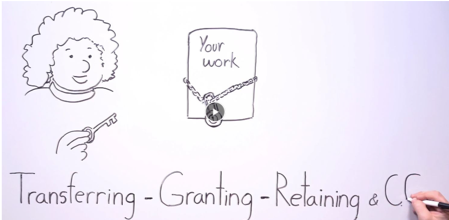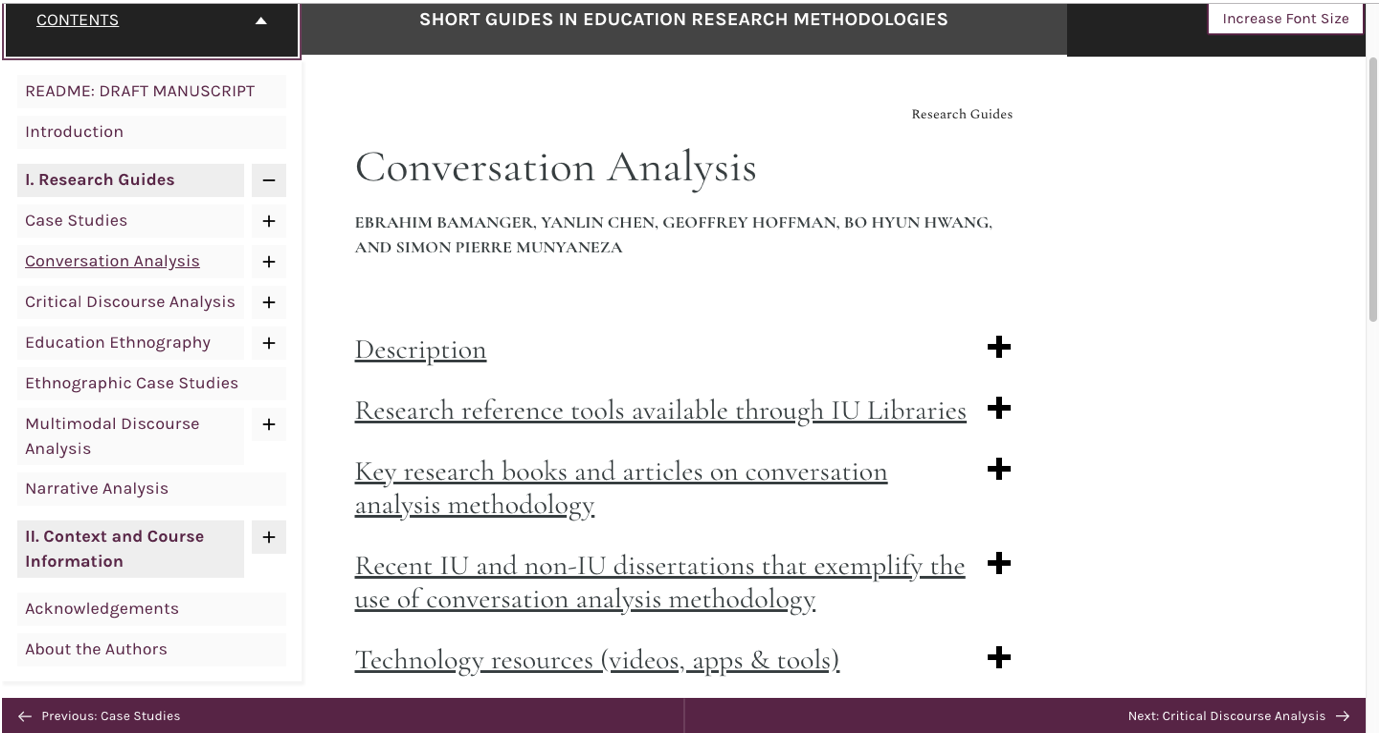It’s Open Education Week again and we’re celebrating Open Educational Resources! In 2018, we hosted a “Driving Student Success through Affordable Course Material” Symposium. The symposium featured three guest speakers from University of Wisconsin-Madison and centered on a UITS-supported book publishing tool, Pressbooks. Lots has happened with OER at IU since then: UITS rolled out Pressbooks for everyone with IU credentials (now anyone can log in and create/ publish OER with Pressbooks) and the Libraries started to partner with CITL and UITS to create tailored OER outreach for instructors in STEM. We’re also hosting a Brown Bag on OER on Wednesday, March 6–join us in person or on Zoom!
One of the most important outcomes of the symposium, though, was a course redesign for an online, doctoral-level course in the School of Education, L700: Seminar in Literacy, Culture, and Language Education (LCLE). The instructor of the course, Beth Lewis Samuelson, attended the symposium and became interested in Pressbooks as a result. Pressbooks is a great tool for authoring course material content: you can import/ export in multiple formats, it’s easy to use and looks like WordPress, and has some added features like built-in plugins for student annotation and engagement with texts.
Beth had already been talking to Julie Marie Frye, Head of the Education Library, about how to redesign the course so that students’ important work could be shared publicly. A core assignment for the course is a group project that asks students to present an overview of a research methodology or theory. The assignment is intentionally designed to give students an opportunity to do a deep dive into a methodology or theory that might be of interest for their dissertation work. The course is required for doctoral students in LCLE and this assignment recognizes that it is impossible to provide a comprehensive overview of every methodology; instead, students explore what is of interest to them with the support of the instructor, colleagues, and librarians.
Our hope was that compiling students’ guides into an OER would both a) make the assignment more meaningful and impactful and b) help other researchers interested in a comprehensive overview of a particular methodology find more information. Students creating OER is often called open pedagogy. Open pedagogy is pedagogy that:
- moves past the “disposable assignment” (where students turn in an assignment, it is graded, and the work ends there) toward assignments that are immediately useful to wider publics
- centers public and visible teaching and learning, expanding the boundaries of the classroom and giving students authentic experiences
- recognizes students as expert, pushing back on narrow definitions of expertise and working from the understanding that student work is worth sharing
As Beth, Julie Marie, and I discussed student-created OER in more detail, we realized that students may need additional support in understanding openness (including Creative Commons) and mastering information literacy concepts related to evaluation, authoring, and entering the information ecosystem as not only readers, but also creators and authors. We also recognized that as doctoral students, it was an important exercise for students to read, understand, and sign a copyright agreement (and practice consulting with a co-author to agree on such an agreement) in order to contribute. Thus, we went with an “opt in” model, which is unique from other open pedagogy projects. Other projects will often be designed around an open class project with students opting out or completing alternative assignments if they don’t want to participate. There are pros and cons to each model but we intentionally chose this design in order to make publication processes and authorship more transparent.
We applied for and were awarded two grants to complete the redesign: a School of Education Teaching with Technology grant and an IU Libraries Information Literacy Course Grant [read our proposal]. These grants gave us funding and a support structure that made the redesign possible. For example, as a result of the grant we were able to hire a Pressbooks editor that kept track of author agreements, set up the Pressbook, collected contributions, and performed basic editing.
The grants also helped us expand the scope of the redesign in order to better support students and enhance their understanding of information literacy issues. As a result of the Teaching with Technology grant, we were able to hire an artist and videographer to create “chalk talks” that present concepts visually and inspire in-depth conversation about complex topics like authority and confidence as a new scholar. Chalk talks are educational videos where an instructor explains a concept verbally while a sketch presents information visually. One goal of shifting to a chalk talk model is that students see information presented in a variety of ways. For example, chalk talks often challenge instructors to illustrate concepts, often requiring that they use metaphors or analogies that help students make connections. The chalk talks also made a “flipped librarian” model possible, where the concepts covered in the talks didn’t also have to be covered in consultations.
We have several colleagues to thank for helping us draft this content. School of Education Professors Mitzi Lewison and Karen Wohlwend generously agreed to meet with us to discuss their research and publication processes. These interviews helped us craft and refine many of the scripts for the chalks talks. Additionally, as a result of the information literacy course grant, we were able to consult with Undergraduate Education Librarian Meggan Press on the chalk talk content, greatly improving how we presented concepts to students.
Four chalk talks were created on the following topics:
- Credibility of Scholars: how scholars establish credibility
- Acknowledgement of Authorities: best practices for acknowledging others’ work and building upon scholars before you
- Challenging Authorities: the challenges of entering the scholarly conversation or information ecosystem as an author, particularly when pushing back on established work
- Your Intellectual Property: how authors publish their work, including an overview of Creative Commons and copyright

A scene from the chalk talk on intellectual property
All of these chalk talks will be openly licensed so that others can use them!
Since L700 was online in Fall 2018, students were asked to answer a few questions about each chalk talk in order to engage with the content. For example, for the video on intellectual property, we asked students:
- Have you ever had to sign a copyright agreement? If so, was it a transfer or did you grant a license to the publisher?
- What excites you about sharing your work formally in the information ecosystem? What’s still intimidating or unclear about sharing your work?
- Explore the Creative Commons License generator. Which license(s) align with how you want your work to be used by others?
- What questions do you still have about copyright and your intellectual property?
Overall, we felt the redesign was successful. Discussions within Canvas about the chalk talks were thorough and engaging. Students had follow up questions about open access dissertations, which resulted in recording a short presentation on dissertations specifically. Each of the Fall 2018 students agreed to contribute to the Pressbook via the contract we drafted in consultation with Copyright Librarian Naz Pantaloni. We are continuing to refine the Pressbook itself but hope to publish it (under a Creative Commons license!) soon. Additionally, L700 students from Spring 2018 and Spring 2019 are also contributing to the Pressbook. Thus, the book will span multiple course sections.
Still, there is work to be done. We continue to be involved in L700 and in mid-February, Julie Marie and I visited the course to facilitate a card sort activity, which asked students to reflect on how they evaluate and prioritize sources for their research. As an example, one of the criteria we discussed with students was cost, which prompted more in-depth conversations about open access than we had with previous iterations of the course.

Short Guides in Education Research Methodologies Pressbook Table of Contents [on left] and sections of one of the research guides on Conversation Analysis [center]
We can’t wait to assess student learning by analyzing the Pressbook, discussion postings, and engagement with the chalk talks. This will help us better understand the redesign and how we could improve the curriculum and our pedagogy. Before our formal assessment we can still say that we learned some lessons along the way! Here are some tips for instructors considering a similar redesign:
- Try to integrate conversations about open access throughout the course, not only when discussing OER. This should be a core component of conversations about finding literature and accessing resources. (This is something the Scholarly Communication department can help with!)
- Try to have curriculum content created before the semester starts! We were creating content while the course was happening, which was a challenging balancing act.
- Think through how design needs to change or adjust when teaching in person vs. online. Every redesign should consider this context and how presentation of content changes based on course makeup and setting.
- Flesh out ways that students might explore different forms of critical annotation. In this assignment, students create a sort of annotated bibliography but using hypothes.is or a similar tool might lend itself to a different kind of engagement.
Are you interested in having your students create a textbook or other OER? Are you interested in better integrating digital literacy topics like curation, evaluation, and sharing intellectual property into your course? Wondering what Pressbooks is and how easy it would be for students to use?
Not sure where to start? We’re happy to help! E-mail iusw@indiana.edu to set up a consultation today.
Leave a Reply